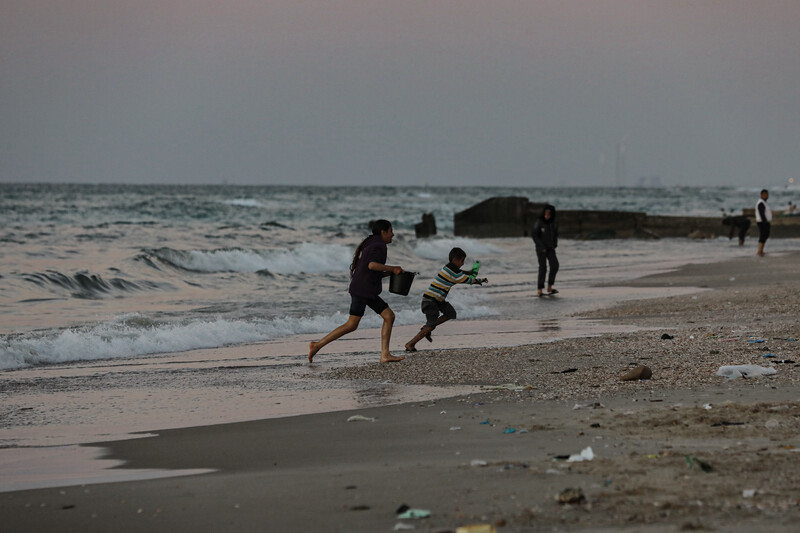The Electronic Intifada 14 December 2023

Displaced Palestinians gather on the beach in Deir al-Balah in the central Gaza Strip, 29 November 2023, during the truce between Israel and Hamas.
APA imagesOn 24 November, the morning the truce was implemented, my uncle woke up in a good mood.
“Good morning, my lovely children,” he said. “For four days, and one after, we will be free.”
“Free?” I asked.
Just for a few days, he replied. “But, God willing, it will remain a perpetual truce.”
It was a relatively cheerful morning. I moved like a little bird around the house, excited because I imagined that the war was over and I had not lost any of my closest friends and family.
It almost felt like a holiday. My aunt brought over ingredients to make falafel, and I made plans to visit relatives who lived several kilometers away.
It had been too dangerous during the previous six weeks, because of the constant Israeli bombardments, to visit them.
It also felt like a day of mourning as I thought of all who have been killed or had their homes destroyed because of Israeli attacks.
My aunt announced that the falafel was ready. We began piling falafel into bread, adding slices of tomato and potatoes – one of my favorite meals.
The meal felt light and hopeful. We made jokes, we laughed, and it felt a little like freedom.
Then my husband Yousef told me it was time to go visit my mom, dad and siblings.
Seeing my family again
Outside, the mood was different than that of our warm family gathering.
We waited half an hour for a car, which is more of a struggle for me because I am pregnant. It felt like we would face the same humiliations and obstacles that we had been facing for six weeks.
Where was the freedom I had felt earlier that morning?
What should’ve been a 10-minute car ride took an hour due to traffic. During our journey, I saw hundreds of people visiting their families.
A line had formed outside a shawarma shop. Others were shopping for winter clothing.
All the scenes one would expect around Eid, but with the awful subtext of war.
When we arrived at my parent’s home, it felt like a dream. It had been 50 days since I last saw them.
We ate chicken and rice, and I felt surrounded by warmth. The four days I spent with them feel so far away now.
We ate popcorn and drank coffee and tea, and shared stories.
My husband and I returned home. On the way, we stopped to eat and to look for winter clothes.
After five hours of searching, we finally found some winter clothing.
The ride home was a long one. It was the last day of the truce.
I grew nervous and concerned about the baby, and whether she is feeling the stress that I am enduring on a daily basis.
At home, we learned that we would have another day of freedom, as the truce was extended. It felt like maybe we were close to the end of all the humiliation and destruction that we’ve endured at the hands of Israel.
Maybe we were one step closer to freedom.
But then, this truce came to an end. The dream of freedom was over. I was fully awake now.
Israeli occupation forces intensified their aggressions against us. They assassinated my beloved professor, Dr. Refaat Alareer.
I could hardly believe it. I felt broken.
When will this nightmare end? I have no more energy.
Israel is trying to annihilate us, to destroy us physically and mentally. How much longer can Israel kill innocent people?
How much longer can we endure the death and destruction?
Batoul Mohamed Abou Ali graduated recently from the Islamic University of Gaza.





